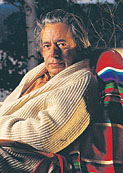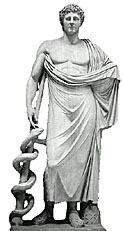On campus
What's the buzz?

Red admiral butterfly (Vanessa atalanta)
When evolutionary biologist JBS Haldane was asked what his studies had taught him about our Creator, he replied, "I'm not sure, but He seems to be inordinately fond of beetles."
Even though bugs outnumber people many times over, as insects' habitats are threatened by humans, the population of our little multi-legged friends is declining.
Terry Wheeler, director of the Lyman Entomological Museum will deliver the Redpath Museum spring lecture, talking about the ecological value of the winged beasties and their conservation. "People tend to think of insects as pests to be controlled or, at worst, completely eliminated," he says. "But insects can be endangered species, too."
"Six-Legged Victims: Endangered Insects and Conservation in the Grassroots Jungle," Wednesday, March 24 at 6 pm in the Redpath Museum auditorium.
Fierce individualism committee

Jack Ruttan
The pursuit of scientific knowledge used to be such a simple thing: sit under an apple tree and an inspiration will fall from the skies, toil away in a lonely garret trying to turn lead into gold and all sorts of useful chemicals will be yours for discovering, leave your cheese out for too long and bingo! — you'll have penicillin.
Those days are long gone, as any professor rushing from committee meeting to committee meeting can tell you. Science — once the province of individualists and iconoclasts — has become an industrialized and organized endeavour. Not a bad thing necessarily — teamwork, organization and communication have all proven to massively boost the rate of scientific discovery.
Steven Shapin, a Harvard professor of the history of science, is coming to McGill to address how the organization of science, and our views of it, have changed over the last 100 years. He says that by the middle of the 20th century, the organization of scientists in industry, government facilities and universities was seen by some to be a substantial problem. Yet those critics of scientific teamwork were not very well informed about how industrial organization worked. Shapin will examine how the scientists, and those who would organize them, saw each other and themselves.
Steven Shapin: "Aristotle and the Industries: The Scientist and the Organization in 20th-Century America," Friday, March 19, 4:30 pm, 3647 Peel Street, Don Bates Seminar Room 101.
Fight cancer, have a ball
Put away the jeans and sneakers. Take out the evening gowns and fancy suits. McGill students are organizing a fundraiser at the Faculty Club ballroom that's sure to be the toast of the party season: the 11th Annual McGill Charity Ball.
On March 13, about 500 students will dance away to the music of DJ Total Entertainment. The goal of the event is to raise funds for McGill Cancer Centre, while increasing student awareness of critical research.
The Annual McGill Charity Ball stands out from other fundraisers, since it's one of the oldest student initiatives held for the benefit of the McGill Cancer Centre. In its 11 years of existence, the event has raised more than $80,000 for the McGill Cancer Centre's research awards program.
The ball is open to students and the general public. Tickets are $25. To buy tickets or to make a donation, call 398-3535. Dancing begins at 9 pm.
Richler then and now

Brian Willer
Canada has produced few writers as polarizing as Mordecai Richler. Loved for his acerbic wit and complete disregard for sacred cows — and loathed for the same reasons — Richler was an author of international standing.
Despite this, the Montreal-born novelist, essayist and occasional polemicist has received remarkably little academic attention, both during his life and after his death in 2001. The Richler Challenge, a symposium being organized by the McGill Institute for the Study of Canada, aims to correct that oversight.
Why the Richler Challenge?
"Richler essentially articulated challenges for his readers, and we want to challenge contemporary readers to come to terms with the impact of Richler's work," said English professor Nathalie Cooke, who is organizing the conference.
With guests that include academics, writers, journalists and publishing industry mavens, the symposium will host several panel discussions on topics such as whether or not Richler is Canadian content, his relationship with Montreal and one examining Richler as a Canadian Jew abroad. In keeping with Richler's spirit, don't expect a quiet academic chat.
"As well as having panelists, we have provocateurs who have been asked to challenge the panelists and push the analysis to the next level. We also have the respondents who will… respond to what they feel are the gaps or the most provocative issues of the conference."
Discussions of Richler's non-fiction work will play a part in all of the panels - one of the guests is Gerald Leblanc, who penned a rebuttal to Richler's notorious 1991 article on Quebec.
Lighter topics include Terry Mosher — known to Gazette readers as editorial cartoonist Aislin — on drawing Richler, and "Four Nights with Mordecai," a reading of a David Macfarlane piece by "Ally McBeal" star Gil Bellows. This will be a world premiere of a work that will play at Stratford.
The Richler Challenge, March 18 and 19, information at www.misc-iecm.mcgill.ca, 398-8346 or linda.huddy@mcgill.ca. Registration fees: $50, full-time students $25. Fees cover the smoked meat luncheons and two cocktails.
Gibson's passion and Jesus's Passion
There have been more depictions of a humble first-century Nazarene carpenter than probably any other historical figure. His Daddy must be proud.
But his followers rarely are: everything from Cecil B. deMille's 1927 effort King of Kings to Norman Jewison's Jesus Christ Superstar have garnered criticism from believers and non-believers alike.
Which brings us to Mel Gibson's The Passion of The Christ. Gibson's aim was to portray the last 12 hours of Jesus's life as accurately as possible, but the film has been criticized as being overly violent and anti-Semitic.
Adele Reinhartz, dean of Graduate Studies and Research, and a professor in the Department of Religion and Culture at Wilfrid Laurier University, believes that Gibson failed in his quest for accuracy too. In "Scripture on the Silver Screen: The Case of Mel Gibson's The Passion of The Christ," Reinhartz will examine the ways in which Gibson uses, and often misuses, the Gospels to create a film that, while surely graphic, she believes is neither accurate nor authentic.
Reinhartz's area of research is first-century Judaism and Christianity, and she is currently completing a study of the Jesus movies, entitled "Jesus of Hollywood."
"Scripture on the Silver Screen: The Case of Mel Gibson's The Passion of the Christ," 11:30 am, March 18, Birks Chapel, 3520 University Street, Faculty of Religious Studies.
Accepting the dying of the light

Death is one of life's certainties. Question is, can dying be rendered more comfortable by health professionals?
Dr. David Kuhl, an expert on care for the gravely ill, will answer that question and more on March 24. The author of What Dying People Want: Practical Wisdom for the End of Life (Doubleday Canada), Kuhl will be the keynote speaker at McGill's first annual Asclepius Project lecture entitled, "Toward a Healing Profession."
Kuhl began his career providing medical care for cancer patients in his private practice. He later developed a palliative care program for persons with cancer and AIDS at St. Paul's Hospital in Vancouver.
He is currently developing a program on how doctors can best communicate with patients on difficult topics.
McGill's Asclepius Project, named after the Greek god of healing, was recently founded by third-year medical student Adam Hofmann and classmates. The Asclepius Project seeks to promote whole-person medicine, alternately known as holistic medicine, which advocates for compassionate patient care among health professionals.
"Toward a Healing Profession," 7 pm, March 24, Charles Martin Amphitheatre, 6th floor of the McIntyre Building. For more information see www.doctorkuhl.com. and consult www.geocities.com/as-clepiusproject.
